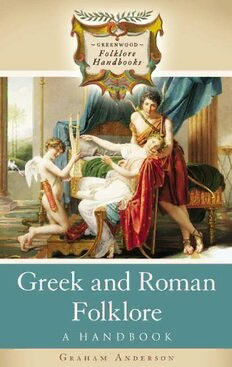
Greek and Roman Folklore: A Handbook (Greenwood Folklore Handbooks) PDF
249 Pages·2006·1.109 MB·English
Most books are stored in the elastic cloud where traffic is expensive. For this reason, we have a limit on daily download.
Preview Greek and Roman Folklore: A Handbook (Greenwood Folklore Handbooks)
Description:
The Greek and Roman world is often noted for the rationalism of a few outstanding thinkers. This book is about the traditional superstitions, beliefs, taboos, folk-remedies, ghost stories, and folk tales that haunted the rest. Along the way it considers such questions as, Do modern approaches help or hinder our attempts to see ancient superstition from the inside? Can we break down the barriers between folk tales and myths? Did it really matter whether a healing herb was picked by moonlight or not? Was there a Cinderella tale in the ancient world?The volume begins by asking how we can attempt to define folklore in the first place, and how we can make sense of the vast amount of materials available. It examines the prejudices of writers who report folkloric information and explores the cultural contexts that shaped their materials. It includes numerous examples and texts, such as tales, legends, proverbs, jokes, riddles, and traditional customs. The volume overviews critical approaches to the study of ancient folklore, and it surveys the presence of Greek and Roman folklore in classical culture. Because of the tremendous interest in the ancient world, this volume will meet the needs of high school students and general readers.
See more
The list of books you might like
Most books are stored in the elastic cloud where traffic is expensive. For this reason, we have a limit on daily download.
